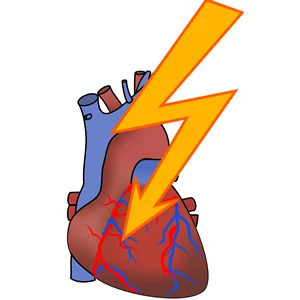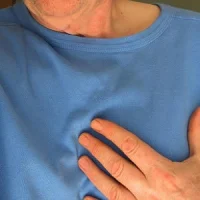A cohort study of data on 26,183 patients resuscitated from an in-hospital cardiac arrest found that patients treated with therapeutic hypothermia were less likely to survive to hospital discharge or to favourable neurological survival. This is in contrast to out-of-hospital cardiac arrest, where therapeutic hypothermia has been shown to improve survival and neurological outcome.
The analysis included patients from 355 U.S. hospitals successfully resuscitated between 1 March 2002 and 31 December 2014, who were either treated or not treated with therapeutic hypothermia. The data analysed was limited to those hospitals with therapeutic hypothermia capability, and included patients on mechanical ventilation to examine outcomes for shockable and nonshockable cardiac arrest rhythms. In-hospital and survival to one year was studies.
 Lead author, Paul Chan, MD (pictured), of Saint Luke’s Mid America Heart Institute, Kansas City, USA, explained in an email to ICU Management & Practice that the study is more representative than prior small studies, and is the largest such study to date.
Lead author, Paul Chan, MD (pictured), of Saint Luke’s Mid America Heart Institute, Kansas City, USA, explained in an email to ICU Management & Practice that the study is more representative than prior small studies, and is the largest such study to date.
“We employed rigorous methodology (propensity scores) to ensure an 'apples to apples' comparison between the hypothermia and non-hypothermia patients, and additional sensitivity analyses were used in our study to address potential biases, Our findings remained similar with these sensitivity analyses”, Chan said.
1568 (6%) of patients received therapeutic hypothermia, and their cases were matched to 3714 non-hypothermia-treated patients.
The patients treated with hypothermia were younger, less likely to have a cardiac arrest in the ICU and more likely to have an initial cardiac arrest rhthym of ventricular fibrillation.
Therapeutic hypothermia was associated with lower in-hospital survival (27.4% vs 29.2%). The association was similar for both nonshockable cardiac arrest rhythms (22.2% vs 24.5%) and shockable cardiac arrest rhythms (41.3% vs 44.1%). Therapeutic hypothermia was also associated with lower rates of favourable neurological survival for the overall study group (hypothermia-treated group, 17 percent; non-hypothermia-treated group, 20.5 percent) and for both rhythm types. At one year there was no survival advantage with therapeutic hypothermia treatment.
Chan said that as smaller studies of hypothermia for in-hospital cardiac arrest or for non-shockable cardiac arrest rhythms have suggested perhaps no benefit, the researchers would not have been surprised to find no benefit. “We were, however, surprised at the lower survival rate among those treated with therapeutic hypothermia in the actual study”, he added.
The analysis found that 21% of patients achieved temperatures below 32 degrees Celsius. Chan observed: “We actually know very little about how well therapeutic hypothermia is implemented in routine practice. In our study, among those with available temperature data,1 in 5 patients who were treated with hypothermia were potentially "over-cooled". If this was indeed the case, it could have adverse consequences and could explain why the hypothermia group had worse outcomes."
"It is conceivable that hypothermia may have no benefit for patients with in-hospital cardiac arrest, but because of poor implementation (e.g., over-cooling patients below what is felt to be safe) in routine practice, it was associated with worse survival outcomes in our registry,” he added.
The analysis included patients from 355 U.S. hospitals successfully resuscitated between 1 March 2002 and 31 December 2014, who were either treated or not treated with therapeutic hypothermia. The data analysed was limited to those hospitals with therapeutic hypothermia capability, and included patients on mechanical ventilation to examine outcomes for shockable and nonshockable cardiac arrest rhythms. In-hospital and survival to one year was studies.
 Lead author, Paul Chan, MD (pictured), of Saint Luke’s Mid America Heart Institute, Kansas City, USA, explained in an email to ICU Management & Practice that the study is more representative than prior small studies, and is the largest such study to date.
Lead author, Paul Chan, MD (pictured), of Saint Luke’s Mid America Heart Institute, Kansas City, USA, explained in an email to ICU Management & Practice that the study is more representative than prior small studies, and is the largest such study to date. “We employed rigorous methodology (propensity scores) to ensure an 'apples to apples' comparison between the hypothermia and non-hypothermia patients, and additional sensitivity analyses were used in our study to address potential biases, Our findings remained similar with these sensitivity analyses”, Chan said.
1568 (6%) of patients received therapeutic hypothermia, and their cases were matched to 3714 non-hypothermia-treated patients.
The patients treated with hypothermia were younger, less likely to have a cardiac arrest in the ICU and more likely to have an initial cardiac arrest rhthym of ventricular fibrillation.
Therapeutic hypothermia was associated with lower in-hospital survival (27.4% vs 29.2%). The association was similar for both nonshockable cardiac arrest rhythms (22.2% vs 24.5%) and shockable cardiac arrest rhythms (41.3% vs 44.1%). Therapeutic hypothermia was also associated with lower rates of favourable neurological survival for the overall study group (hypothermia-treated group, 17 percent; non-hypothermia-treated group, 20.5 percent) and for both rhythm types. At one year there was no survival advantage with therapeutic hypothermia treatment.
Chan said that as smaller studies of hypothermia for in-hospital cardiac arrest or for non-shockable cardiac arrest rhythms have suggested perhaps no benefit, the researchers would not have been surprised to find no benefit. “We were, however, surprised at the lower survival rate among those treated with therapeutic hypothermia in the actual study”, he added.
The analysis found that 21% of patients achieved temperatures below 32 degrees Celsius. Chan observed: “We actually know very little about how well therapeutic hypothermia is implemented in routine practice. In our study, among those with available temperature data,1 in 5 patients who were treated with hypothermia were potentially "over-cooled". If this was indeed the case, it could have adverse consequences and could explain why the hypothermia group had worse outcomes."
"It is conceivable that hypothermia may have no benefit for patients with in-hospital cardiac arrest, but because of poor implementation (e.g., over-cooling patients below what is felt to be safe) in routine practice, it was associated with worse survival outcomes in our registry,” he added.
Next Steps
The authors recommend a randomised clinical trial to assess the efficacy of therapeutic hypothermia for in-hospital cardiac arrest. Chan said that they are looking into the possibility of doing a hypothermia trial within the registry (GWTG-Resuscitation). This would entail randomising patients at enrolling sites to do active hypothermia vs. usual care (which would be simply avoidance of fevers). The details of what temperature goals they would be cooled to (33C vs. 36C, or just between 33C to 36C) would still need to be worked outSourcSource Credit:: JAMA
References:
Chan PS, Berg RA, Tang Y, Curtis LH, Spertus JA; for the American Heart Association’s Get With the Guidelines-Resuscitation Investigators (2016) Association between therapeutic hypothermia and survival after in-hospital cardiac arrest. JAMA, 316(13): 1375-1382. doi:10.1001/jama.2016.14380.
Latest Articles
cardiac arrest, hospital, Therapeutic hypothermia
A cohort study of data on 26,183 patients resuscitated from an in-hospital cardiac arrest found that patients treated with therapeutic hypothermia were less likely to survive to hospital discharge or to favourable neurological survival.










